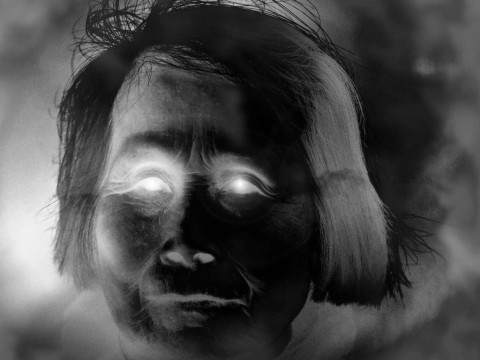What you’ve forgotten in Chinese you have not yet learned in English: this is what happens when you spend four years in life, but three and a half in America. Your parents attend classes at the university that runs this town. While they are away, old shrinking Chinese ladies take turns watching you from the plastic wrapped couch. As the hours pass, the lady recedes into herself, the dent in the couch rises like dough, the plastic flattens out, until she is floating, this old shrinking lady, an apparition in the living room, the room where you make your living.
You live by fighting. You are a Power Ranger. You sit cross-legged on the floor sharpening two wooden swords. Your father fashioned them at a woodshop in a different department. Hiyah! You thrust one sword into the breast of an old shrinking lady, but it goes right through—no blood, just a whiff of musty air. Where does it come from, this onionskin smell? Ai! Ai! Ai! Another day, another old lady goes down, except she doesn’t; the sword slices her in half but she puts herself back together like a cloud. I’m hungry! you say. And thirsty! But you don’t know what to call the bright red cans you saw last at the Mexican grocery, the ones that fizz when you open them, releasing a scent of apples into the air, sweet fake candy apples.
The old shrinking lady of the day moves you with her eyes. Stick your head under the tap, the eyes say. Make yourself some rice. Douse it with soy sauce like the white folks do. And they’re right. Simple! Delicious! You could live off a diet of soy sauce rice and the leftovers your mother brings back from the restaurant: sesame chicken, orange chicken, General Tso’s chicken. What strange, delightful chickens!
Your mother goes to school with your father, but she also works the late shift at the restaurant. An old white couple eats there once a week and loves your mother dearly. They decide to call her Joy, because she is a Joy, so she is Joy, your mother. During bedtime, Joy gushes to you about the old white couple. The Chinese and Mexicans are lousy tippers, she says, but the old white couple treats your mother dearly. You can see their old white hearts ballooning out of their bodies. The old white couple expands, and the restaurant expands with them, until it is a palace, Joy’s Oriental Palace of College Station, with a gold plated banquet hall for giants, the old white couple the most loyal giants of them all.
The summer before you start school, you put down your swords and take up a pencil. You have ideas. You want to write about the giants who visit the palace, and the old shrinking ladies who serve them. You want to write about the towers of porcelain plates shouldered by the ghostly ladies, who have become as fragile and as small as the plates. You want to write about the bundles of bills that get lost in the night of the giants’ gigantic pockets. But you don’t have the words for such stories yet, not in any language. So you thrust your pencil into the skin of the paper until lead courses through the paper’s blood, seeping out of the corners onto the floor, until you are sitting on a floor of lead-blood in the living room, an old shrinking Chinese lady watching over you. You will write nothing, nothing at all, and that will be enough for now.

Notes from Guest Reader Hadiyyah Kuma
I love this story because it speaks writing’s need to inhabit a character, to find play within your life, and the joy in creating work about the little things in life that move you. The concept of not being able to translate that experience into concrete words is one many storytellers can relate to and Han addresses it so tenderly.


 The core workshop of SmokeLong Fitness is all in writing, so you can take part from anywhere at anytime. We are excited about creating a supportive, consistent and structured environment for flash writers to work on their craft in a community. We are thrilled and proud to say that our workshop participants have won, placed, or been listed in every major flash competition. Community works.
The core workshop of SmokeLong Fitness is all in writing, so you can take part from anywhere at anytime. We are excited about creating a supportive, consistent and structured environment for flash writers to work on their craft in a community. We are thrilled and proud to say that our workshop participants have won, placed, or been listed in every major flash competition. Community works.